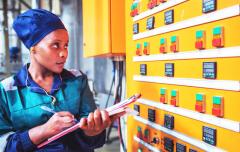Partner Spotlight: ACCESS Coalition promotes gender perspectives in energy plans
In honor of International Women’s Month, SEforALL interviewed People-Centered Accelerator partners about their efforts to promote gender equality, social inclusion and women’s empowerment in the energy sector. In this interview, Jacqueline Kimeu, international coordinator for the Alliance of Civil Society Organizations for Clean Energy Access, known as the ACCESS Coalition, discusses the organization’s work in achieving these goals.
Tell us about ACCESS Coalition. What areas do you focus on?
ACCESS was founded in 2014 and is based in Nairobi, Kenya. It is a global coalition of 64 civil society organizations (CSOs) and practitioners whose mission is to advocate for people who live in poverty to have access to safe, reliable and affordable energy, and to achieve environmentally sustainable and efficient energy systems globally. Most ACCESS members are based in sub-Saharan African countries that have high levels of energy poverty. Although sub-Saharan Africa is the main priority area for ACCESS, some ACCESS members also operate in Asia and Latin America.
We focus on addressing three key gaps, including the lack of integrating the energy needs of poor communities into energy sector planning and decision-making; the lack of understanding and uptake by governments and investors of evidence-based and innovative approaches needed to deliver SDG 7; and the lack of participation by communities and civil society in national, regional and international energy planning and decision-making processes.
How does ACCESS Coalition support increasing energy access?
ACCESS uses three key approaches to support increasing energy access.
First, the Coalition relies on the experience of members and the wider evidence base to advocate for and ensure that the development needs of poor and marginalized groups living in “the last mile” are better understood and prioritized in national and international energy service planning and delivery as well as integrating them into wider development decision-making.
Second, we document and build understanding among our members and key external actors concerning best practices as well as successes or failures in last-mile energy service delivery. We share the “lessons learned” to increase the impact of stakeholders operating in the energy access space.
Third, we document evidence about the energy access “development dividend” and use this to build understanding among key actors of the role that modern energy services can play in delivering wider development outcomes.
You are a People-Centered Accelerator (PCA) partner. Why is a focus on gender equality, social inclusion and women’s empowerment necessary in the energy sector?
Energy has significant links to gender equality. Men and women have different energy needs as well as different levels of access to resources and decision-making. Women generally have less access to finance and energy-related services than men. Yet they play a pivotal role in energy production, distribution and utilization, especially in poor communities. They are also the most affected by a lack of access to energy. Thus, the lack of involvement and recognition of the role of women in energy discussions results in gender-blind energy planning and delivery. A platform focused on gender equality, social inclusion and women empowerment is therefore important to ensure that gender perspectives are incorporated in energy planning and delivery, and helps to inform programs and increase energy access.
What plans does ACCESS Coalition have for 2019?
ACCESS has developed a broad and global three-year strategy for 2019 to 2021, with advocacy as a key theme. This includes two work streams covering national implementations of SDG7 and Africa Development Bank advocacy, and a third cross-cutting work stream on knowledge and capacity building. This year, ACCESS continues to operationalize this strategy with key activities centered on establishing ACCESS Regional Coordinating nodes in eastern, western and southern Africa, with a specific focus on Kenya, Ghana and Zambia.
In line with this strategy, ACCESS will engage and work with relevant government agencies and other stakeholders in the three focus countries to support integrated national energy planning and ensure effective implementation of SDG7. It will also build the capacity of ACCESS members and other key stakeholders, such as CSOs and those in the private sector, and provide knowledge and research to increase the impact of the CSOs in reaching SDG7.
What are ACCESS Coalition’s key contributions to the PCA program?
Since ACCESS spans local, national, regional and international levels, the Coalition is ideally placed to promote greater communication and more coherent action among a range of stakeholders. These groups work within and across different national contexts, regions and at different scales, to deliver SDG7, with a focus on last mile energy delivery. ACCESS also provides a platform to convey transformational impacts on gender equality in energy access, including gender metrics in national policies and programs, as well as convening multi-stakeholder dialogues on various energy-related topics.
How does ACCESS Coalition partner with SEforALL?
ACCESS Coalition partners with SEforALL in several ways. These include supporting multi-stakeholder dialogues at the national and regional level in the three focus regions by bringing together key stakeholders, thus leveraging SEforALL’s convening power.
We use the communications and outreach functions of SEforALL to support knowledge exchange and communicate lessons on efforts to deliver SDG7, with a focus on last mile energy delivery.
ACCESS Coalition also participates in side events at SEforALL events to champion energy access and reach out to national governments, CSOs and the private sector.
This is part of our efforts to support resource mobilization for the capacity building of ACCESS members and other CSOs and development organizations so that they can engage effectively in national and regional processes related to SDG7 implementation, with a focus on ensuring the last mile delivery of energy.
Photo credit: Sanou Dieudonné, Program Officer OCADES Caritas Dédougou




